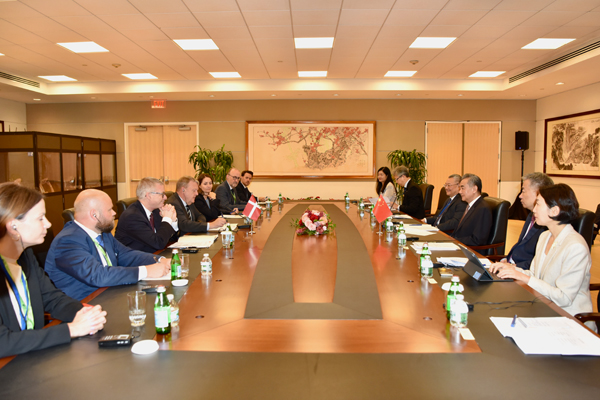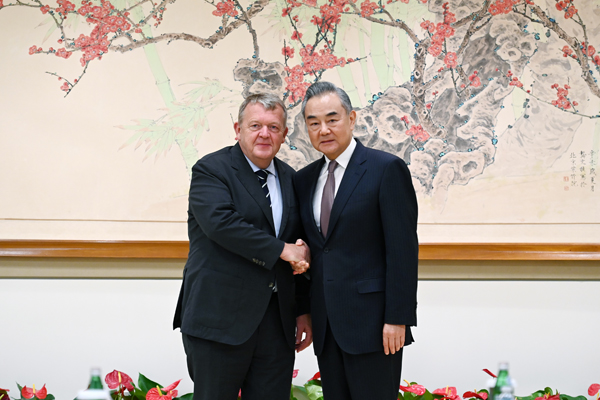China has today announced visa-free travel for Danish passport holders, following a meeting of the Danish and Chinese Foreign Ministers yesterday at the UN General Assembly in New York.
Speaking in a Chinese ministry press release yet to be circulated to English media, Foreign Minister Wang Yi described Denmark as “China’s only comprehensive strategic partner in Northern Europe”, and said that the relationship between the two countries has long been at the forefront of China’s relations with Nordic countries.
“China has decided to implement a visa-free policy for Denmark. We welcome more Danish friends to visit China, and we also hope that Denmark will introduce more convenient measures for Chinese personnel to visit Denmark,” wrote the Ministry.
It added that China is willing “to plan high-level exchanges” with Denmark and to further develop bilateral relations, and congratulated Denmark on its recent election as a non-permanent member of the Security Council.
The Ministry’s announcement emphasises China’s commitment to the green transition, and states that it is “willing to strengthen green transformation cooperation with European countries including Denmark.”
In June, the European Union raised tariffs on Chinese electric vehicles to protect the bloc’s domestic motor industry.
The new tariffs on individual manufactures range from 17.4 percent to 37.6 percent, which is on top of a 10 percent duty that was already in place for all electric cars imported from China, according to the BBC.
It was a blow to Beijing: The EU is the largest overseas market for China’s EV industry. The tariffs could see the cost of electric cars rise across the bloc, making them less affordable for European consumers.
The Chinese Ministry of Foreign Affairs alluded that Denmark should play a role in challenging those tariffs, commenting:
“The EU’s imposition of high tariffs on China’s green products runs counter to efforts in green transformation. The two sides should find a proper solution through consultation, and hope that Denmark will play an active role in this regard.”
It further added that it expected that Europe and the United States “will find a way to properly handle trade frictions”.

In the announcement, the Chinese Ministry underlines that “Denmark adheres to the one-China policy”.
Officially, the Danish government has since 1950 recognized the People’s Republic of China as the sole legal government of China – known as the ‘One China policy’ – without taking a position on Taiwan’s political status.
However, it is a cautious stance, according to Andreas Bøje Forsby, a senior researcher in foreign policy and diplomacy at the Danish Institute for International Studies.
The position is shared by Denmark’s Nordic neighbours, Norway, Finland, Iceland and Sweden, and is frequently overstated by Chinese ambassadors who make excessive claims about their host countries’ support for an “undivided China”.
Forsby explains that the “vague and unspecified character” of the One China policy makes it very difficult for the Nordics to counter Beijing’s growing assertiveness of the matter, but that Denmark can be described as a “commercial pragmatist” in terms of its practical arrangement of non-official relations with Taiwan.
Denmark operates low-key trade offices in Taipei alongside Taiwanese representative offices in their own capitals for the sake of promoting economic interests.
Løkke said that Danish-Chinese relations have “maintained a good momentum of development, and cooperation in various fields has progressed smoothly”, according to the Chinese ministry.
China is currently handing out several visa-free policies.
During an official visit to China earlier in September, Norwegian Prime Minister Jonas Gahr Støre met with Chinese President Xi Jinping, who announced that Norwegians would soon be allowed to travel to China without having to apply for a visa.
“This will make it much easier for Norwegian business representatives, students and others to travel to China. It also lays the foundations for closer cooperation,” said Støre.
Since December 1, 2023, visa-free entry for 15 days has been granted to visitors from France, Germany, Italy, the Netherlands, Spain and Malaysia.
Since March 14, 2024, travelers from Switzerland, Belgium, Luxembourg, Ireland, Hungary and Austria have been able to enter China without a visa.
On July 1, 2024, the list of visa-free countries was extended to include Poland, Australia and New Zealand.
On 26 September, China announced that Greece and Slovenia would also benefit from the policy.
The Chinese visa waiver aims to boost the tourism sector, which is still recovering to pre-pandemic levels and to encourage trade by simplifying short-term business trips.
Meanwhile, application processes for those who still need a visa have been simplified: the requirement for an appointment to submit a visa application has been abolished and consular fees reduced.
Visa applicants are also exempted from fingerprinting until December 31, 2025.
Denmark is yet to release its own press release on the new visa-free policy.















